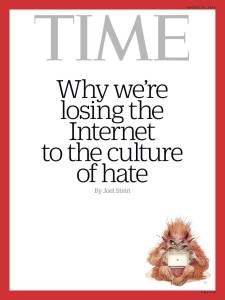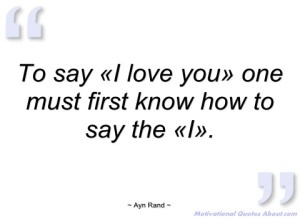A culture of hate.
September 14, 2016
“One can see discourse norms shifting online, and they’re probably linked to behavior norms. When people think it’s increasingly O.K. to describe a group of people as subhuman or vermin, those same people are likely to think that it’s O.K. to hurt those people,” says Susan Benesch, founder of the Dangerous Speech Project and faculty associate at Harvard’s Internet and Society center.
[…]
“…trolling has become the main tool of the alt-right, an Internet-grown reactionary movement that works for men’s rights and against immigration and may have used the computer from Weird Science to fabricate Donald Trump.”
[…]
“When sites are overrun by trolls, they drown out the voices of women, ethnic and religious minorities, gays–anyone who might feel vulnerable. Young people in these groups assume trolling is a normal part of life online and therefore self-censor. An anonymous poll of the writers at TIME found that 80% had avoided discussing a particular topic because they feared the online response. The same percentage consider online harassment a regular part of their jobs. Nearly half the women on staff have considered quitting journalism because of hatred they’ve faced online, although none of the men had. Their comments included “I’ve been raged at with religious slurs, had people track down my parents and call them at home, had my body parts inquired about.” Another wrote, “I’ve had the usual online trolls call me horrible names and say I am biased and stupid and deserve to be raped. I don’t think men realize how normal that is for women on the Internet.”
[…]
“A Pew Research Center survey published two years ago found that 70% of 18-to-24-year-olds who use the Internet had experienced harassment, and 26% of women that age said they’d been stalked online. This is exactly what trolls want. A 2014 study published in the psychology journal Personality and Individual Differences found that the approximately 5% of Internet users who self-identified as trolls scored extremely high in the dark tetrad of personality traits: narcissism, psychopathy, Machiavellianism and, especially, sadism.”
Full article:
How Trolls Are Ruining the Internet
David Whyte.
FORGIVENESS
is a heartache and difficult to achieve because strangely, the act of forgiveness not only refuses to eliminate the original wound, but actually draws us closer to its source. To approach forgiveness is to close in on the nature of the hurt itself, the only remedy being, as we approach its raw center, to reimagine our relation to it.
It may be that the part of us that was struck and hurt can never forgive, and that forgiveness itself never arises from the part of us that was actually wounded. The wounded self may be the part of us incapable of forgetting, and perhaps, not meant to forget…
Stranger still, it is that wounded, branded, un-forgetting part of us that eventually makes forgiveness an act of compassion rather than one of simple forgetting…
Forgiveness is a skill, a way of preserving clarity, sanity and generosity in an individual life, a beautiful question and a way of shaping the mind to a future we want for ourselves; an admittance that if forgiveness comes through understanding, and if understanding is just a matter of time and application then we might as well begin forgiving right at the beginning of any drama, rather than put ourselves through the full cycle of festering, incapacitation, reluctant healing and eventual blessing.
…at the end of life, the wish to be forgiven is ultimately the chief desire of almost every human being. In refusing to wait; in extending forgiveness to others now, we begin the long journey of becoming the person who will be large enough, able enough and generous enough to receive, at our very end, that necessary absolution ourselves.
‘FORGIVENESS”
Excerpt from CONSOLATIONS


